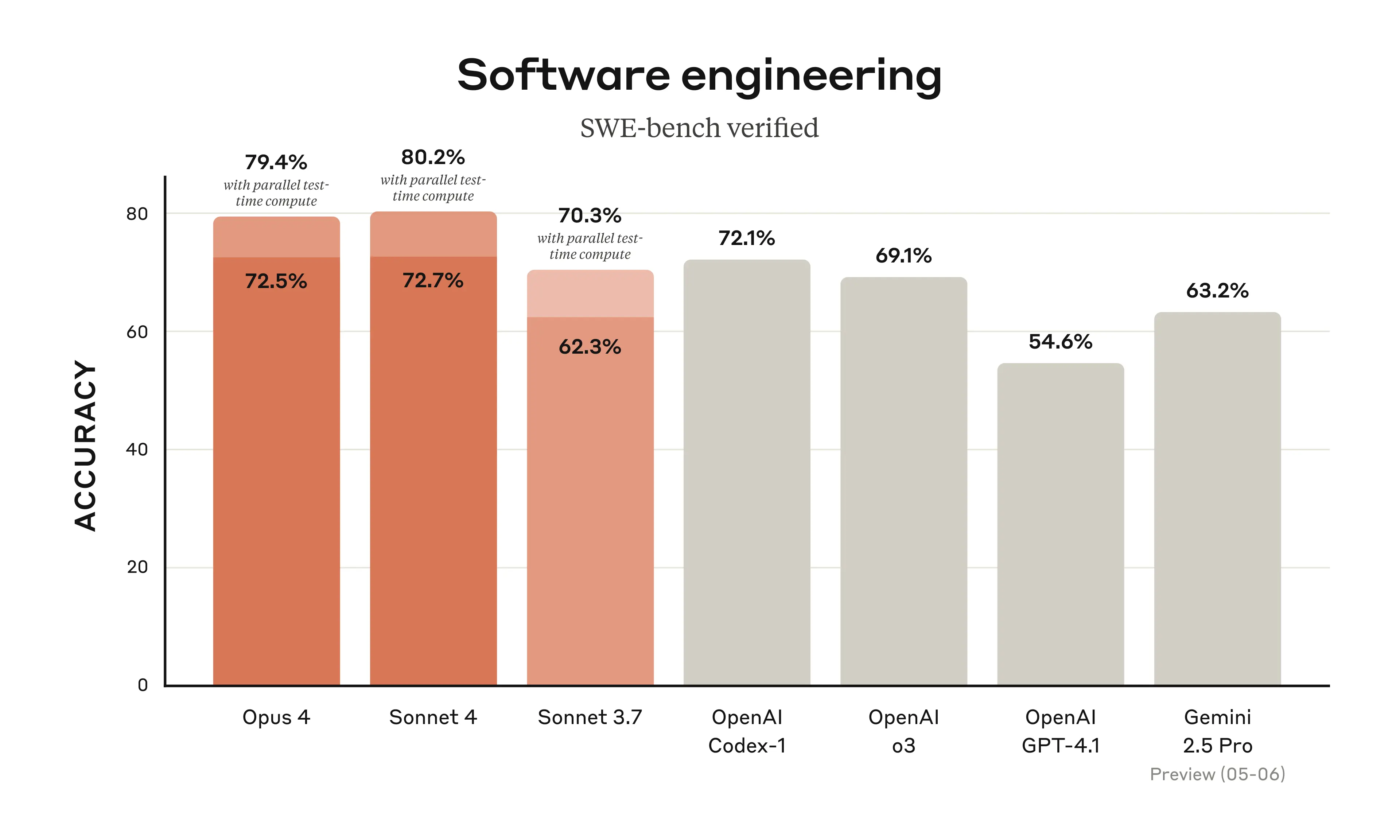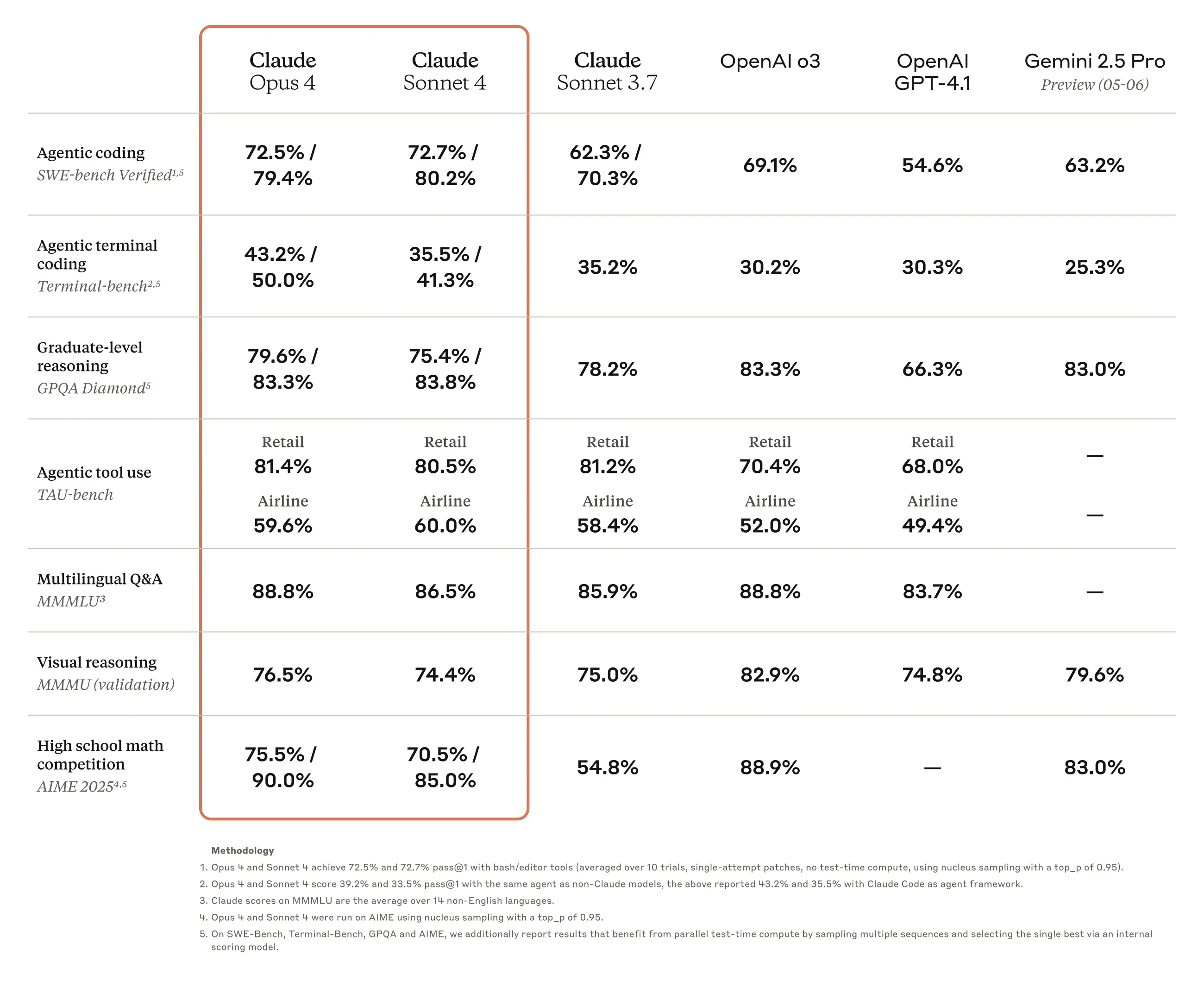- Published on
Claude 4 Launches with Major Advances in AI Coding and Reasoning
- Authors

- Name
- Daniyal Afaqi
- Follow
Anthropic has announced the launch of Claude 4, the next generation of its large language models, introducing Claude Opus 4 and Claude Sonnet 4. These models mark a significant leap in AI capabilities, particularly in software development, advanced reasoning, and agent workflows.
- Claude Opus 4: The Pinnacle of AI Coding
- Claude Sonnet 4: Smart, Fast, and Accessible
- New Capabilities and Ecosystem Expansions
- Claude Code: Now Generally Available
- Availability and Pricing
Claude Opus 4: The Pinnacle of AI Coding
Claude Opus 4 is being positioned as the most advanced coding model available, setting new performance benchmarks across industry-standard evaluations. It leads the field with 72.5% on SWE-bench and 43.2% on Terminal-bench, demonstrating unmatched sustained performance on complex, multi-step tasks.
Opus 4 is engineered for depth and endurance, capable of executing long-running processes over several hours without degradation. Industry leaders have already begun integrating it into their workflows:
- Cursor calls it state-of-the-art for code understanding and manipulation.
- Replit reports substantial improvements in precision and multi-file edits.
- Block notes it's the first model to consistently enhance code quality during debugging.
- Rakuten validated its performance during a demanding 7-hour independent refactor.
- Cognition praises its reliability on challenges where previous models fall short.
 Image courtesy of Anthropic.
Image courtesy of Anthropic.
Claude Sonnet 4: Smart, Fast, and Accessible
Claude Sonnet 4 builds on the success of Sonnet 3.7, bringing better reasoning, coding, and instruction-following to a broader user base. Achieving 72.7% on SWE-bench, it offers a balance of performance and efficiency, ideal for both enterprise and individual use.
Highlights include:
- GitHub is adopting Sonnet 4 for its next-gen Copilot coding agent.
- Manus notes improved reasoning and more aesthetic outputs.
- iGent reports near-zero navigation errors and improved autonomy in app development.
- Sourcegraph sees it as a major advancement in software development.
- Augment Code cites its precision in surgical code edits and complex task execution.
 Image courtesy of Anthropic.
Image courtesy of Anthropic.
New Capabilities and Ecosystem Expansions
Extended Thinking and Tool Use (Beta)
Claude 4 models support "extended thinking" by leveraging tools like web search during reasoning. This allows the model to alternate between cognitive processing and tool interaction for enhanced accuracy and context.
Parallel Tool Execution and Memory Enhancements
Both Opus 4 and Sonnet 4 now support parallel tool usage and improved long-term memory. When provided access to local files, Opus 4 can extract, retain, and reference key facts, building an internal knowledge base over time. For instance, when playing Pokémon Red, Opus 4 created a custom "Navigation Guide" using its memory features.
Reduced Shortcut Behavior
Anthropic reports a 65% reduction in "shortcutting" behavior—where models exploit task loopholes—in Claude 4 compared to Sonnet 3.7, leading to more genuine and reliable task execution.
Thinking Summaries and Developer Mode
To enhance transparency, Claude 4 introduces automatic summarization for long reasoning chains, though it’s only needed in about 5% of cases. Developers requiring full trace access can request the new Developer Mode for raw thought chain visibility.
Claude Code: Now Generally Available
Following strong feedback from its research preview, Claude Code is now generally available. The platform is designed to deeply integrate Claude’s capabilities into development environments:
- VS Code and JetBrains Extensions (Beta): Claude Code offers inline suggestions and edits directly within the IDE, making pair programming more seamless.
- Claude Code SDK: Developers can now build custom agents with the same core technology used by Claude Code.
- Claude Code for GitHub (Beta): Enables PR tagging to fix CI errors, respond to feedback, or edit code autonomously. Install via
/install-github-appin Claude Code.
Availability and Pricing
Claude Opus 4 and Sonnet 4 are accessible via the Anthropic API, Amazon Bedrock, and Google Cloud’s Vertex AI. Both models are included in Pro, Max, Team, and Enterprise Claude plans, while Sonnet 4 is also available to free users. Pricing is consistent with previous generations:
- Opus 4: $15 (input) / $75 (output) per million tokens
- Sonnet 4: $3 (input) / $15 (output) per million tokens
Claude 4 represents a substantial step forward for AI, bringing cutting-edge capabilities in reasoning, memory, and software engineering to organizations and developers alike. With Opus 4 at the frontier and Sonnet 4 delivering broad utility, Anthropic continues to shape the future of intelligent systems.